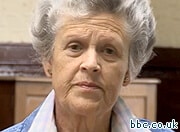The Church of England’s ruling body is to debate whether the new Girl Guides’ promise – which removes reference to God – discriminates against Christians.
General Synod member Alison Ruoff has tabled the private member’s motion because she says young girls and leaders have to choose between faith and Girlguiding.
Last September, Girlguiding UK officially introduced a new secular promise, replacing “to love my God” with “to be true to myself and develop my beliefs” – the first substantive change to the pledge in the movement’s 103-year history.
Promise
In a briefing paper, Mrs Ruoff says it “cannot be right” for Guide units which meet in church premises to be banned from being able to say “I love my God” in the promise.
One group is already in the process of being expelled from the association over its decision to give its members a choice of using the traditional or the new promise.
The 37th Newcastle Guide Unit was told their membership will end on 31 December.
Discrimination
The motion, to be debated by the General Synod when it meets in February, says: “That this Synod believe that girls of all ages in the Girlguiding Movement should not suffer discrimination but be able to continue to promise to love God when enrolled rather than making a wholly secular promise.”
More than 120 fellow General Synod members have indicated they believe the issue is worth debating by adding their signature to the motion.
Mrs Ruoff also said in her briefing paper that this is a “serious gospel issue”.
Marginalisation
She said: “The Scout movement have retained their ‘old’ promise, to love God, as well as having a secular promise. Why therefore should the Guiding movement not be allowed to have choice? It is rank discrimination against the girls of this wonderful youth movement.”
She added that “it could be seen as contributing to the further marginalisation of Christianity in this country which as Christians, it surely is our duty to resist”.
William Fittall, the Secretary General of the General Synod, reminded members in a background note that at the time of the Guides’ consultation on a change to the promise, the Church of England urged people to contact the movement.
He also said the Church’s Communications Office “issued a briefing note which said ‘it is the role of the Church of England to defend the exercise of faith, especially where it is being squeezed.'”

